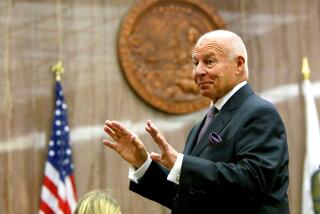Free legal advice through a middleman is no bargain
- Share via
Question: Our homeowner association hired a management company whose best selling point was that it had an attorney to provide unlimited free legal advice. Yet we’ve found that we cannot call the attorney directly.
The procedure for utilizing this free legal advice entails us calling the management company owner, who in turn calls the attorney and asks him our question. The management company then calls the board back and gives us the attorney’s answer or advice.
Is this legal -- and how do we know for certain that the management company actually got the advice directly from the attorney?
Answer: Your board has no way of knowing. And even if the advice did come from the attorney, it could be altered in translation. Either way, the association and its members are courting disaster.
It would be wise to check whether the attorney’s fees were built into the management company charges when it promised free unlimited legal advice. The Rule of Professional Conduct 1-320 forbids attorneys from having financial arrangements with non-lawyers. This means management company personnel cannot receive payment for relaying legal advice or have arrangements with an attorney to do so.
Under the Rule of Professional Conduct 1-310, a licensed attorney “shall not form a partnership with a person who is not a lawyer if any of the activities of that partnership consist of the practice of law.” This means a management company cannot contract with the attorney or bill for the attorney, and it cannot relay that attorney’s advice to the association.
Business and Professions Code Section 6125 states, “No person shall practice law in California unless the person is an active member of the state bar.” The management company cannot engage its attorney to relay advice to the company to be delivered to your board.
If the management company employees are not licensed attorneys, they may be prosecuted for practicing law without a license or possible charges of “capping” (which entails soliciting business for an attorney) or the attorney can be disciplined for sharing fees with non-attorneys.
This is not the way an association should conduct its operations.
Even though your association is probably paying for the attorney’s advice, the “association” is not the attorney’s client. Regardless of who the attorney is, if the board does not have a direct relationship and contract with that attorney, the association is not the client. When the advice goes through an intermediary, such as a management company, there is no attorney-client privilege for the association and no confidentiality when it comes to your discussions.
By allowing the attorney to discuss your association’s matters with a third party, the privilege of confidentiality has been waived.
Here, there is no way of knowing whether the management company or its other clients are also receiving or sharing advice from this attorney for which your association is in effect paying.
Finally, the attorney may be violating his ethical obligations by not disclosing the relationship with the management company to your association. The board must take precautions to avoid activities that have the potential of subjecting the association or its members to liability.
*
Send questions to P.O. Box 11843, Marina del Rey, CA 90295 or e-mail noexit@mindspring.com.
More to Read
Inside the business of entertainment
The Wide Shot brings you news, analysis and insights on everything from streaming wars to production — and what it all means for the future.
You may occasionally receive promotional content from the Los Angeles Times.










